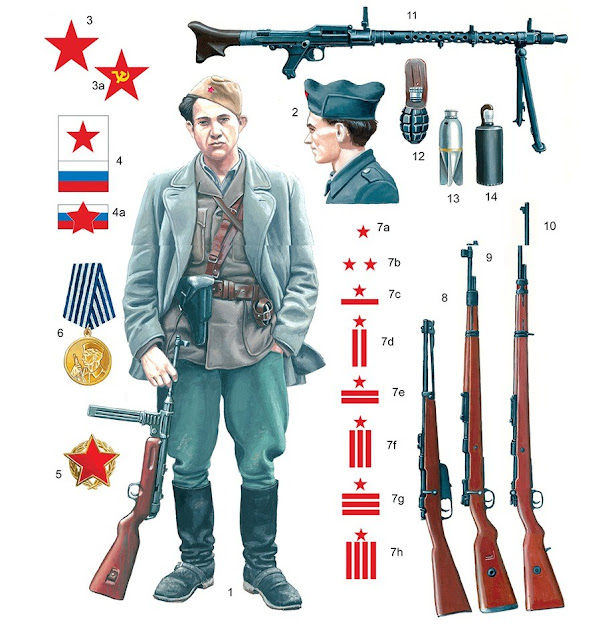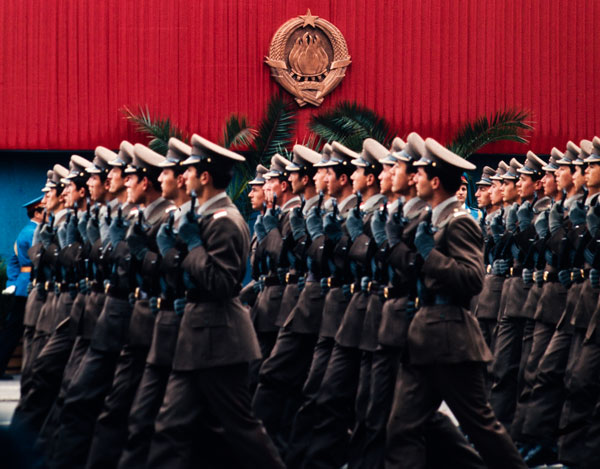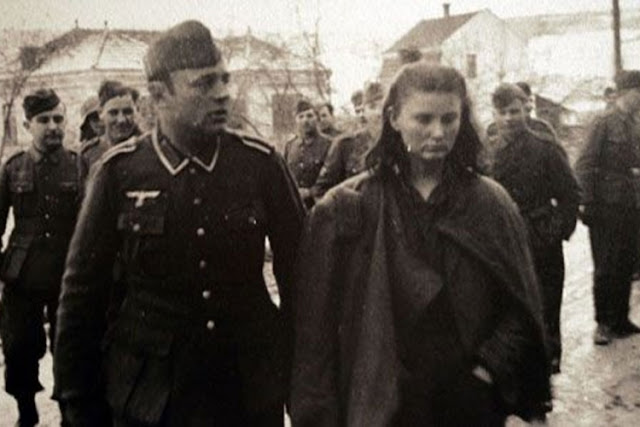German Operation "Marita"
 |
| German Panzer III tanks during the Battle of Greece |
The Battle of Greece (also known as Operation Marita, German: Unternehmen Marita) is the common name for the Axis invasion of Allied Greece by Nazi Germany in April 1941 during the Second World War. It is concomitant to the stalled Fascist Italian invasion known as the Greco-Italian War. It is usually distinguished from the Battle of Crete, which came after mainland Greece had been subdued. These Axis operations were part of the greater Balkan Campaign of Germany.
 |
| The map in English of the battle of Greece in April 1941 during World War II. |
April 6, 1941, German forces are simultaneously attacked Yugoslavia and Greece. Greek border guards on the border gave brief but strong resistance and later withdrew to fortified positions Metaxas Line. Although they were superior, the German units on the first day are not recorded greater success and better results because the Greek units defend all their positions. However, in the early evening, on April 6, the position of the Greek unit suddenly worsened. On the western slopes of the mountain, Belasica German Sixth Mountain Division pushed the Yugoslav units through the valley of Strumica so, the German unit without problems entered the valley Butkovska River. At the same time, anterior assault detachments of the German Second Panzer divisions are performing over the Yugoslav position, broke out west of Lake Dojran, thereby endangering the entire Greek combat position on Metaksasovoj determined line. Therefore, the Greek Supreme Command ordered the withdrawal of the remaining forces to the south of the Albanian border and Mount Olympus.
 |
| German artillery firing during the advance through Greece - Copy |
In the morning, 7 April, with strong artillery, tank, and air support German troops launched the attack, but again without much success, because they took no significant fortification of Metaxas Line. The following day German troops attacked a Greek-British unit in the western Greek Macedonia. German 18th and 40th Corps aims to rapid breakthroughs prevent the withdrawal of the Greek army in Albania and the organization of new Greek defense line Olympus - Smolikas - the Greek-Albanian border. On 10 April the German units occupied the town of Florina, and so fulfill the task to prevent the organization of the Greek defense on Mount Olympus. Greece Western Macedonia and Epirus army on April 7, launched an attack towards Albania, but they due to the deep breakthrough of German in other sectors retreated to their starting positions.
 |
| German advance until 9 April 1941, when the 2nd Panzer Division seized Thessaloniki |
The situation of Greek units was getting every day more difficult. The supplying unit was made difficult because of the constant bombardment of German and Italian aviation. The Germans sent motorized forces in western Greece with the aim of cutting retreat Epirus and Western Macedonia's army.
 |
| Australian anti-tank gunners resting, soon after their withdrawal from the Vevi area - Copy |
On April 13, the attack started 9th. Italian, a day after the 11th Italian army from their positions in Albania. At the same time, German forces gradually overcame the resistance of the Greek-British units at Olympus and continued the attack until the outbreak in Thessaly. By 21 April the German-Italian units continued to concentrate advancing in order to surround and break the Greek-British units that are still offered resistance.
 |
| German Panzer Korps PzKpfw III XI protects a mountain pass Greece 1941-01 |
The English, recognizing the impossibility of further efficient of resistance in Greece and concerns about the weak defense of Crete, which is its ideal position allowed control of the eastern Mediterranean began to evacuate its units from Greece. It has had to shake the Greek soldiers and officers, but they decided to continue to resist.
 |
| Retreating Greek soldiers, April 1941 |
The British withdrew in the night of 19 on April 20, to Thermopylae. German troops occupied the town without problems Volos, Farsala, Lamia, in Epirus the German forces broke out in front of the city and thus endanger departure of the Greek units, which were incredibly slowly withdrawing from Albania. After the agreement with the commanders of the 1st and 2nd Corps, commander of the 3rd Corps Kolakoglu, dismissed the commander of Epirus Army General Drakos, without the approval of the Supreme Command Konakoglu began negotiations with the Germans on 21 April.
 |
| World War 2 British soldier surrender during the battle of Greece in the region of the Olympus mountain. The Battle of Greece known as Operation Marita, |
Thus, on 23 April in Thessaloniki signed the capitulation of the Greek army. The same day, the Greek King George II and the government left the Athens and fled by plane to the island of Crete. After all this, the Greek Supreme command who would not recognize the capitulation had collected a small number of devoted units and up to 30 April and the Greek unit protected the retreat of the British who were rapidly retreating.
21-23 April Germans broke the British forces thermopile and continued progress toward Athens, which was occupied 27 April.
 |
| British Matilda Tank being inspected by German forces after being abandoned Greece 1941-01 |
On 26th April, the Germans were carried out air assault on Corinth. On 29th April, they managed to take Corinth and continue to the southern Peloponnese. British expeditionary corps managed to the 1st May evacuate about 53,000 troops. Many of these soldiers were transferred to the Egyptians and less on Crete.
 |
| German troops raise their flag over the Acropolis, Athens, Greece May 1941 |
on 20 May 1941. The Germans employed parachute forces in a massive airborne invasion and attacked the three main airfields of the island in Maleme, Rethymno, and Heraklion. After seven days of fighting and tough resistance, Allied commanders decided that the cause was hopeless and ordered a withdrawal from Sfakia. By 1 June 1941, the evacuation was complete and the island was under German occupation.
 |
| Paratroopers on Crete_'41 |
Greek forces capitulated after seven months of heavy fighting (from October 1940 to June 1941). Although under-armed (a small number of tanks, artillery, and supply) the Greek soldiers were shown extraordinary courage and endurance. The Greek campaign ended with a complete German and Italian victory. Almost the entire Greek army was captured except smaller units, which was evacuated with the British. According to British sources, the British losses amounted to about 11,840 soldiers. Italians were for seven months of the war had about 90,000 dead and wounded.
In enumerating the reasons for the complete Axis victory in Greece, the following factors were of greatest significance:
Germany superiority in ground forces and equipment;
The bulk of the Greek army was occupied fighting the Italians on the Albanian front.
German air supremacy combined with the inability of the Greeks to provide the RAF with adequate airfields;
Inadequacy of British expeditionary forces, since the Imperial force available was small;
Poor condition of the Hellenic Army and its shortages of modern equipment;
Inadequate port, road and railway facilities;
Absence of a unified command and lack of cooperation between the British, Greek and Yugoslav forces;
Turkey's strict neutrality;
The early collapse of Yugoslav resistance.
Sources:
Drugi svjetski rat, Mladost, Ljubljana. 1980. Org. BERICHT VAN DE TWEEDE WERELD OORLOG, Amsterdam, 1975.
http://www.asisbiz.com/Battles/Balkans-Campaign.html






Comments
Post a Comment